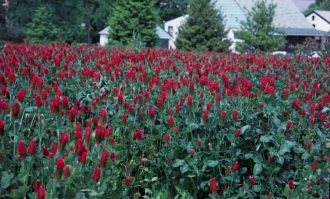NASHVILLE, Tennessee - Healthy soil plays an important role in the economic and environmental sustainability of farms. While awareness for the benefits of healthy soil has increased in recent years, a lack of technical and financial information on some beneficial soil management practices has limited adoption in Tennessee.
To solve this, Jason de Koff at Tennessee State University worked with professionals from the University of Tennessee, the USDA Natural Resources Conservation Service and the Tennessee Association of Conservation Districts to apply for a Professional Development Program Grant through the Southern Sustainable Agriculture Research and Education program.
The two-year grant was funded by the Southern SARE program to provide participants with training and resources including materials from the USDA NRCS, training modules on the economics of soil health and cover crops, a soil health test kit and access to demonstration plots planted in each region of the state to compare management practices.
The soil health test kit allows extension agents to measure soil pH, soil electrical conductivity, soil infiltration rates and soil temperature on farms and ranches. The test kit was integrated into the training to enhance the course.
The demonstration plots were planted in farmers’ fields or research and extension centers across the state. Plots were either left unplanted or planted with a cover crop mix to highlight the beneficial effects of cover crops.
Some plots were planted with only winter wheat and others received only crimson clover. Other plots received a five-way blend of Austrian winter pea, tillage radish, crimson clover, cereal rye and winter wheat. Additional plots were planted in a ten-way blend of Austrian winter pea, tillage radish, crimson clover, cereal rye, winter wheat, spring oat, annual ryegrass, alfalfa, mustard and turnip.
Several groups worked together to construct the curriculum and implement the program. An advisory group of two farmers and one extension agent from each region of the state gathered in a virtual setting to discuss the project.
Based on the work of this group, Tennessee State University researcher Jason de Koff along with David McMillen and Greg Bann of the USDA NRCS, Mike Hubbs with the Tennessee Association of Conservation Districts and Danny Morris from the University of Tennessee developed the curriculum and training manual.
Over the course of the grant project, 32 agriculture professionals were educated. Taking their knowledge and soil health test kits with them, these participants have returned to their communities to help increase awareness and pass along knowledge on soil health. The curriculum and training manual for the Soil SMaRTS program is also available in every county extension office in the state of Tennessee. For more information on the Southern SARE program or the grant project ES18-141, please visit https://southern.sare.org.
Published by the Southern Region of the Sustainable Agriculture Research and Education (SARE) program. Funded by the USDA National Institute of Food and Agriculture (NIFA), Southern SARE operates under cooperative agreements with the University of Georgia, Fort Valley State University, and the Kerr Center for Sustainable Agriculture to offer competitive grants to advance sustainable agriculture in America’s Southern region. This material is based upon work that is supported by the National Institute of Food and Agriculture, U.S. Department of Agriculture, through Southern Sustainable Agriculture Research and Education, under sub-award number: ES18-141. USDA is an equal opportunity employer and service provider. Any opinions, findings, conclusions, or recommendations expressed in this publication are those of the author(s) and do not necessarily reflect the view of the U.S. Department of Agriculture.
